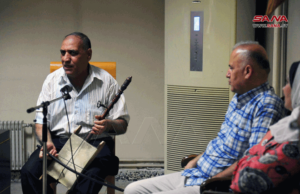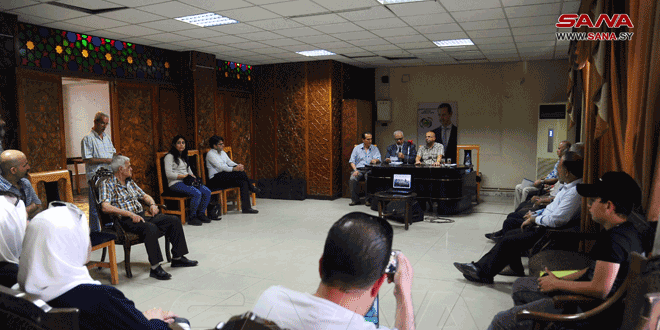A cultural evening entitled “Tangible and Intangible Heritage in the Occupied Golan” in Al-Adawi Cultural center in Damascus
Damascus, (ST) – On the 48th anniversary of the liberation of Quneitra from the Zionist occupation and the raising of the flag of the Syrian Arab Republic by the founding leader Hafez Al-Assad in 1974, the Arab Cultural Center in the Al-Adawi neighborhood in Damascus hosted a cultural evening entitled “Tangible and Intangible Heritage in the Occupied Golan.”
The evening was attended by Dr. Ammar Al-Nahar, head of the history department at Damascus University, Dr. Khaled Al-Fayyad, researcher in heritage affairs, Ahmed Al-Hassan, researcher in Golan affairs, and poet Khaled Sweid.
At the beginning of the evening, a documentary film was shown about the orientalists who documented the Julani heritage. Dr. Al-Nahar explained that heritage has extended roots and forms the fabric of a cohesive and homogeneous society. He pointed out that one of the most prominent aspects of the conflict with the Zionist entity is the heritage front, as the occupying entity tries repeatedly to forge heritage and attribute it to it.
Researcher Ahmed Al-Hassan defined the Julani heritage song as a mixture of the environments of the Julani society and it is distinguished by their meticulousness and wonderful melodies.
Meanwhile, Fayyad spoke in the evening about the distinctive customs of our people in the occupied Golan and the etiquette of hospitality.
 The poet, Khaled Sweid participated in patriotic poems that spoke about the Golan and on the occasion of raising the Syrian flag in the sky of Quneitra.
The poet, Khaled Sweid participated in patriotic poems that spoke about the Golan and on the occasion of raising the Syrian flag in the sky of Quneitra.
The poet Ajaj Nayef Hammad also recited folk poems from the Golan heritage accompanied by the Rababa instrument.
RaghdaSawas

